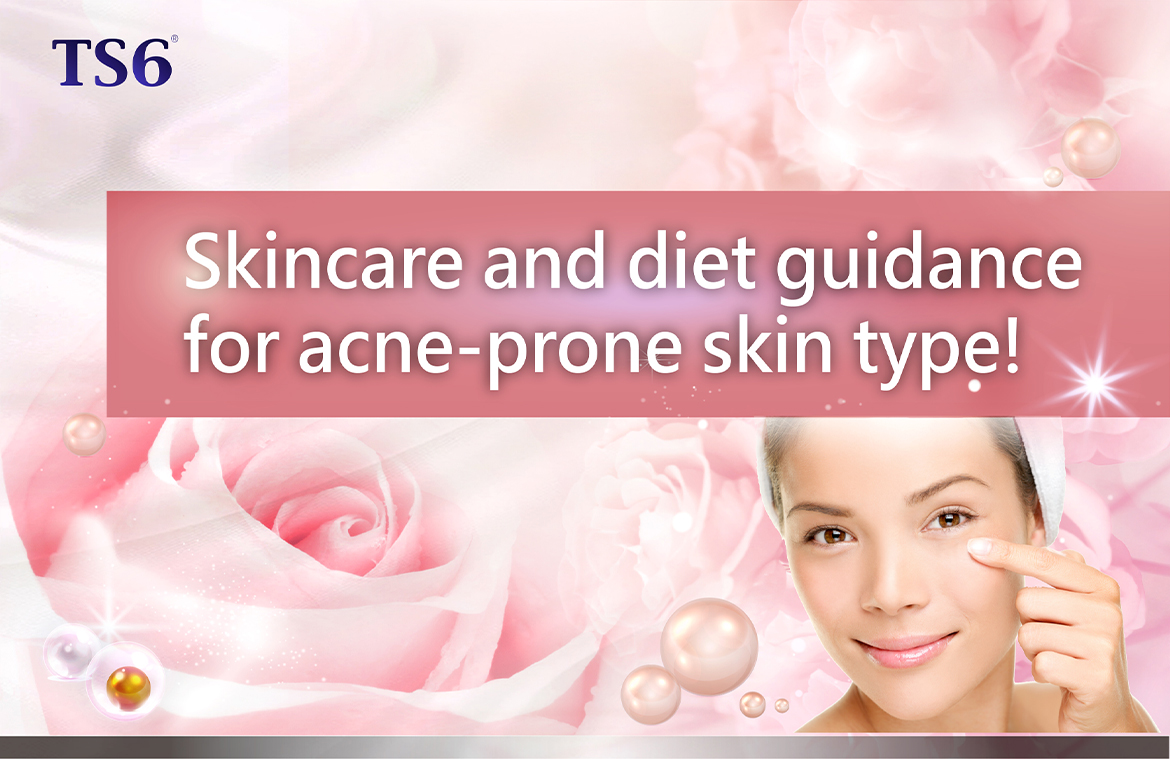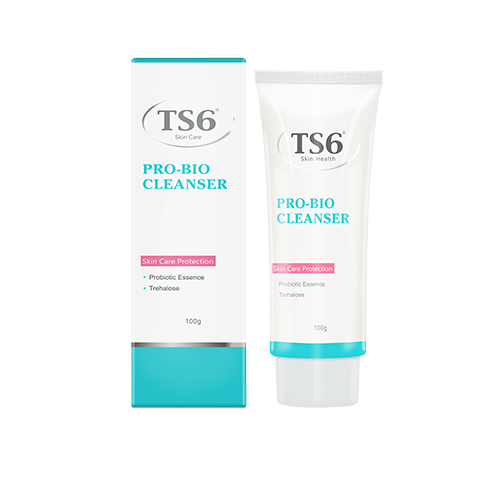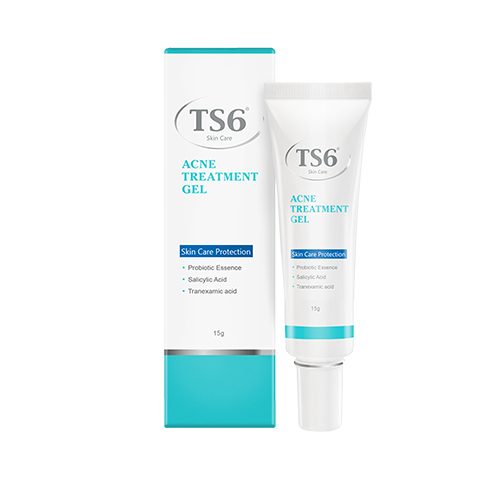2023-09-06

When it comes to skincare, it is always better to follow the guide which is as simple as possible. Especially for people with acne-prone skin type (oily skin type) as they tend to have abnormal epidermal metabolism and strong sebum secretion, leading to blackheads, whiteheads, and inflamed acne (pimples). Thus, it is critical to pick suitable skincare products as well as diets for your skin. Maintaining a good and healthy diet is definitely a plus for the skin. In this article, we focus on how to take care of acne-prone skin (oily skin) regarding daily skincare routines and diets.
Acne skin care routine
People with acne-prone skin types should not apply too many products or thick textures as it might clog the pores and cause acne formation. Remember the following concept - clean, acid, and sunscreen, the three main things to do for stable skin condition.
Moring skincare
Moring skincare
- Gentle face wash
Wash your face twice a day in the morning and at night. However, if you feel your skin is fine in the morning, you can skip it. - Acne treatment gel
Apply a thin layer on your inflamed acne (pimples) to curb further inflammation. - Lightweight sunscreen
Do not need to stress enough how important sun protection products are. Apply it in the morning for both sun protection and moisturizing effects.
Night skincare
- Gentle face wash
Cleaning is the first step to have healthy skin. Wash out the dusts on your face to avoid clogged pore and make further products absorb effectively. - Acne treatment gel
Apply a thin layer on your inflamed acne (pimples) to curb further inflammation. - Add salicylic acid skin care products
It can help prevent clogged pores and improve acne breakouts, and it can apply at night. - Refreshing and moisturizing (night)
You can apply it as the final step to keep everything locks in your skin.
The products in TS6 Probiotic Skincare Series all contain TS7®, a patented Yogurt Filtrate, which is rich in amino acids, vitamins, folic acids, biotin, and lactic acid; the natural antibacterial substances may suppress specific bacterium; it also can improve the synthesis of CollagenⅠ, Ⅲ, Fibronection, and Cornifin. Hence, it is good for the skin.
Foods that cause acne
When people are prone to acne, having a healthy diet is a way to help prevent acne formation as skin health and gut health are closely related. After consuming unhealthy food, it will release harmful substances into the blood and cause inflammation. In contrast, a healthy diet promotes better digestion, and immunity, helping fill up beneficial substances, such as vitamins and minerals that are beneficial to skin and overall health.
There are three main categories which if people eat too much would cause worse skin conditions: foods are high-sugar, high-fat, and dairy products, they could lead to even more serious acne problems and skin inflammation.
Foods high in sugar, such as desserts, cookies, sugary drinks, and bread, will raise blood sugar, which stimulates insulin secretion to move glucose from the blood into the cells of the body. However, excessive insulin secretion causes skin cells to grow faster and promotes sebum production, increasing the likelihood of clogged pores and thus contributing to acne formation.
Food is high in fat like fried food, animal fat, etc., has more saturated fat and trans fat and promotes inflammation in the body and acne.
Finally, the reason why dairy products are easy to aggravate acne is that certain amino acids in milk can promote the secretion of insulin, and certain factors in insulin can promote sebum secretion. Excessive sebum secretion and pore-clogging can make acne bacteria easily breed and cause acne.
There are three main categories which if people eat too much would cause worse skin conditions: foods are high-sugar, high-fat, and dairy products, they could lead to even more serious acne problems and skin inflammation.
Foods high in sugar, such as desserts, cookies, sugary drinks, and bread, will raise blood sugar, which stimulates insulin secretion to move glucose from the blood into the cells of the body. However, excessive insulin secretion causes skin cells to grow faster and promotes sebum production, increasing the likelihood of clogged pores and thus contributing to acne formation.
Food is high in fat like fried food, animal fat, etc., has more saturated fat and trans fat and promotes inflammation in the body and acne.
Finally, the reason why dairy products are easy to aggravate acne is that certain amino acids in milk can promote the secretion of insulin, and certain factors in insulin can promote sebum secretion. Excessive sebum secretion and pore-clogging can make acne bacteria easily breed and cause acne.
Anti acne diet
In the above paragraph, we know food high in sugar, fat, and dairy products can cause acne formation. Now let's talk about anti-acne foods which can benefit the skin and overall health.
There are several concepts that you can remember before ahead: Fatty fish, good fat sources, dark green veggies, and fruits full of vitamin C. The above foods are really beneficial when it comes to skin health and overall health as well.
Fatty fish, such as salmon, and mackerel, have abundant omega-3 which is good for skin health. It can moisturize and soften the skin, and also help fight inflammation, reducing redness and acne caused by skin inflammation.
Healthy fat sources like avocado and nuts. Avocado, known as the "super fruit", contains vitamins A, B, C, E, K, and essential fatty acids. It helps people delay aging, and keep skin moistured.
Nuts are good plant fat sources and have many minerals, they have many benefits: protect cardiovascular health, enhance immunity, moisturize the skin, anti-aging, and reduce inflammation.
Fruits and vegetables are important antioxidants, rich in minerals and vitamin C, and can improve the body's protection and reduce oxidative stress damage.
Yellow and dark green vegetables, such as broccoli, spinach, and cauliflower, are rich in vitamin A and vitamin C. Vegetables with darker or brighter colors have a more significant impact on the health of the body, help maintain skin elasticity, and reduce the growth of wrinkles.
Guava, kiwi, berries, orange, tomato, and other fruits with vitamin C not only have antioxidant effects but also help collagen production which slows down aging, and keeps the skin moisturized and plump.
Not to mention, staying hydrated is one of the keys to staying healthy, it can help promote metabolism and maintain body functions. Drink at least 1500 to 2000c.c. of water every day. Not only eating healthy food but drinking enough water is the crucial point to skin health.
You can be aware of the above concepts regarding acne-prone skincare and a healthy diet, both of these daily habits could massively affect skin health. “You are what you eat” is a slogan that really makes sense.
There are several concepts that you can remember before ahead: Fatty fish, good fat sources, dark green veggies, and fruits full of vitamin C. The above foods are really beneficial when it comes to skin health and overall health as well.
Fatty fish, such as salmon, and mackerel, have abundant omega-3 which is good for skin health. It can moisturize and soften the skin, and also help fight inflammation, reducing redness and acne caused by skin inflammation.
Healthy fat sources like avocado and nuts. Avocado, known as the "super fruit", contains vitamins A, B, C, E, K, and essential fatty acids. It helps people delay aging, and keep skin moistured.
Nuts are good plant fat sources and have many minerals, they have many benefits: protect cardiovascular health, enhance immunity, moisturize the skin, anti-aging, and reduce inflammation.
Fruits and vegetables are important antioxidants, rich in minerals and vitamin C, and can improve the body's protection and reduce oxidative stress damage.
Yellow and dark green vegetables, such as broccoli, spinach, and cauliflower, are rich in vitamin A and vitamin C. Vegetables with darker or brighter colors have a more significant impact on the health of the body, help maintain skin elasticity, and reduce the growth of wrinkles.
Guava, kiwi, berries, orange, tomato, and other fruits with vitamin C not only have antioxidant effects but also help collagen production which slows down aging, and keeps the skin moisturized and plump.
Not to mention, staying hydrated is one of the keys to staying healthy, it can help promote metabolism and maintain body functions. Drink at least 1500 to 2000c.c. of water every day. Not only eating healthy food but drinking enough water is the crucial point to skin health.
You can be aware of the above concepts regarding acne-prone skincare and a healthy diet, both of these daily habits could massively affect skin health. “You are what you eat” is a slogan that really makes sense.
Contact Form
Contact us now for your business need.
Related Blogs
How to know what are the suitable skin routines? Regarding different skin types
Anti-aging Skincare Contains Daily Skincare Routine, Habits, and Recommended Supplements
What is collagen? What can it help for aging skin?
Introducing TS6 Acne treatment gel: Repair skin cells in a healthy way
How to prevent aging skin? What could Pro-Bio cleanser do for it?
Let's talk about Probiotic yogurt filtrate - TS7®
What is acne? What could cause acne formation? Probiotic skincare recommendations and so!
How to nicely treat acne-prone skin?



 Home
Home










